WHEELS OF INDUSTRY.
Page 4
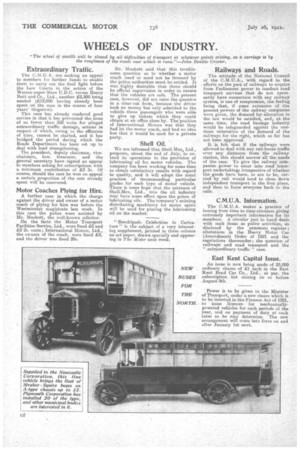
Page 5
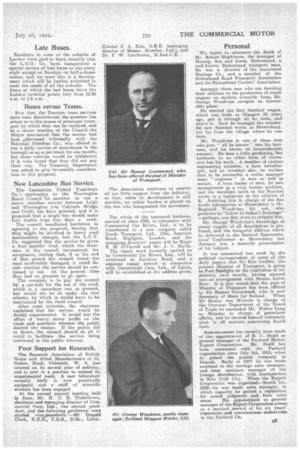
Page 6
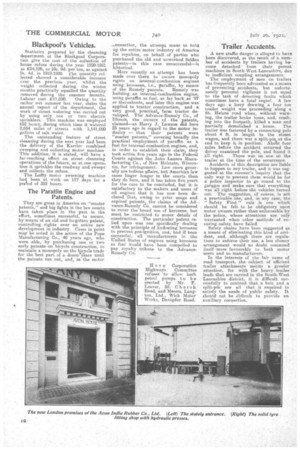
Page 7
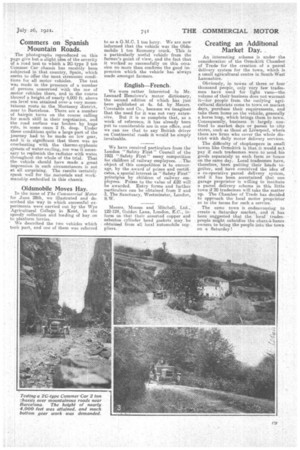
Page 8
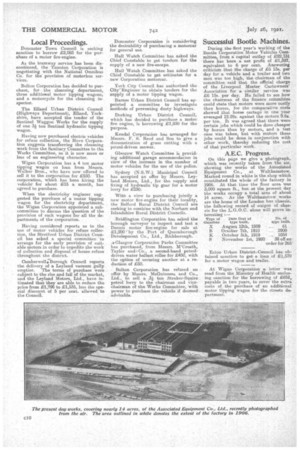
If you've noticed an error in this article please click here to report it so we can fix it.
The wheel
oj wealth will be slowed by all difficulties of transport at whatever points arising, as a carriage is by the roughness. of the-roads over which it runs."—John Beattie Crozier.
Extraordinary Traffic.
The C.M.U.A. are making an appeal to members fur further funds to enable them to carry out the final fight before the Law Courts in the action of the Weston-super-Mare U.D.C. versus Henry Butt and Co. Ltd. another £2,500 being needed (212 ' ,000 having already been spent on the case in the course of four years' litigation). This case has already rendered good service in that it, has prevented the issue of no fewer than 350 writs foralleged extraordinary traffic damage, actions in respect of which, owing to the effiuxion of time, cannot be started, and it has bridged the period during which the Roads Department has been set up to deal with road strengthening. The president, deputy chairman, vicechairmen, hon. treasurer, and the general secretary have signed an appeal to members asking for subscriptions with a minimum contribution of £3 3s. Of course, should the case be won on appeal a certain proportion of the sum already spent will be recovered.
Motor Coaches Plying for Hire,
A further case in which the charge against the driver aiid owner of a motor 'coach of plying for hire was before the Westminster magistrate last week. In this case the police were assisted by Mr. Muskett, the well-known solicitor.
On the facts the Motor Transport Facilities Service, Ltd.. were fined 25 and £2 2s. costs; International Motors, Ltd., the owners of the coach, were fined £3, and the driver was fined 20s.
Mr. Muskat said that this troublesome question as to whether a motor coach need or need not be licensed by the police authorities must be settled. It was highly desirable that there should be official supervision in order to ensure that the vehicles are safe. The present case, however, did not raise the question in a clear-cut form, because the driver took no money but only admitted to the vehicle those passengers who were able to give up tickets which they could obtain at an office close by. The position of International Motors was that they had let the motor coach, and had no idea but that it would be used for a private party.
Shell Oil.
We are informed that Sheil-Mex Ltd.,
proposes, about the end of July, ex-_ tend its operations to the provision of lubricating oil for motor vehicles. The company has been working for some time to obtain satisfactory results with regard to quality, and it will adopt the usual practice of recommending particular grades for each type of motor vehicle. ,There is some hope that the entrance of Shell-Mex, Ltd., into the oil industry may have some effect upon the prices of lubricating oils. The 'company's existing distributing machinery for motor spirit will be used for placing the lubricating oil on the market.
" Brooklpds Celebrities• in Carieslure" is the subject of a very interesting supplement, printed in three colours on art paper, drawn specially and appearing in The Motor next week.
Railways and Roads.
The attitude of the National Council of the C.M.U.A., with regard to the efforts on the part of railways to acquire from Parliament power to conduct road transport services that do not necessarily have connection with any railway system., is one of compromise, the feeling being that, if some extension of the present powers of the railway companies were given, the demand for alteration in the law would be satisfied, and, at the same .time, theroad haulage industry would be safeguarded against the .constant reiteration of the demand of the railways for the right, which so far has not been approved.
It is felt that if the railways were allowed to deal with any rail-borne traffic over any distances from the railway station, this should answer all the needs of the case. To give the railway companies power to enter into road transport undertakings irrespective of whether the goods have been, or are to be' carried by rail would tend to close down independent transport in the first place, and then to force everyone back to the
C.M.U.A. Information.
The C.M.U.A. makes a practice of issuing from time to time circulars giving extremely important information for its members. A circular just to hand deals with such items as police activities, as disclosed by the summons register; alterations in the Heavy Motor Car (Amendment) Order of 1921 and the regulations thereunder; the question of railways and road transport and the "extraordinary traffic " case.
East Kent Capital Issue.
An issue is now being made of 25,000 ordinary shares of £1 each in the East Kent Road Car Co., Ltd., at par, the subscription list closing on or before August 8th.
Power is to be given to the Minister of Transport, under a new clause which is to he inserted in the Finance Act of 1921, to issue licences for mechanicallypowered vehicles for such periods of the year, and on payment of duty at such rates as he may determine. The new arrangement will come into force on and after January 1st next.
Late Buses.
Residents in some of the suburbs of London were glad to learn recently that the L.G.O. Co. have inaugurated a :special service of late buses to run every night except on Sundays on half-a-dozen routes, and we trust this is a development which will be further extended to meet the needs of all the suburbs. The' times at which the last buses leave the London terminal points vary from 12.30 a.m. to 1.0 a.m.
Buses versus Trarns.
Now that the Taunton tram services have been discontinued the question has arisen as to the means of passenger transport by which they can be replaced, and at a recent meeting of the Council the Mayor announced that the matter had been adiscussed informally with the National Omnibus Co., who offered to run a daily service of motorbuses in the borough as an eaperiment for one month, but these vehicles would be withdrawn if it were found that they did not pay their way. The Tramway Department was asked to give favourable consideration to this proposal.
New Lancashire Bus Service.
The Lancashire United Tramways Co.'s application to the Warrington Rural Council for sanction to run a motor omnibus service between Leigh and Warrington (via Culeluth Bridge and Croft) has been granted, and it is proposed that a single bus should make four double trips four days a week.
The council manifested hesitation in agreeing to the proposal, fearing that they might be involved in heavy road maintenance charges, but the Co. suggested that the service be given a four months' trial, which the chairman of the council recommends for acceptance, stating that, if at the end of that period the council found the road moderately damaged, it Could decide whether the service should be continued or not. At the present time they had ins grounds to go upon.
The company is to pay the council 3d. a, car-Mile for the use of the road, which is a secondary one at present, but would not be so under the new scheme, by which it, would have In be maintained by the rural council.
After some criticism, the chairman explained that the service would be doubly experimental. It would test the effect of heavy motor traffic on the roads and ascertain whether the public desired the change. If the public did so desire, the canned should do all it could to faeilitate the service being continued in the public interest,
Poor Support for Research.
The Research Association of British Motor and Allied Manufacturers of 15, Bolton Road, Chiswick, W. 4, has entered on ite second year of activity,. and. anti is new in a position to extend its experimental work_ A new laboratory recently built is now practically equipped and a staff of scientific workers has been engaged.
At the annual general meeting held in June, Mr. H. C. B. lInderdown, chairman and managing director of Core. mercial Cars, Ltd., was elected president, and the following gentlemen were elected vicsapre.sidents t—Sir Dugald Clerk, K.B.E., F.R.S., D.Sc., Lieut.
Colonel J. director of Dr. F. W. A. Cole, O.B.E. (managing Messrs. Humber, Ltd.), a I...Rochester, M.Inst.C.E.
The Association continues to receive all too little support from the industry, so that,while its development is still possible, an unfair burden is placed on the few who inaugurated the movement.
The whole of the transport business, carried on since 1908, in connection with Commercial Car Hirers, Ltd., is to be transferred to a new company called Goods Transport, Ltd., 112a, Junction Road, Highgate, London, and the nianaging directors' names will be Major E. li. O'Farrell and Mr. J. C. Smith,
The repair work formerly carried on by Commercial Car Hirers, Ltd., will be continued at Junction Road, and a separate repair branch in connection with Commercial Cars, Ltd., of Luton, will be established at the address given.
Personal
We regret to announce the death csr. Mr. Robert Hopkinson, the manager of Mossop, Son and 'Jones, Birkenhead, a well-known Birkenhead transport man. He was a director of the Associated Haulage Co., and a member of the Birkenhead Road Transport Association and the Birkenhead Carters' Association.
Amongst those men who are devoting their abilities to the production of steam wagons on modern scientific linea Mr. George Woodvine occupies an honourable place.
He erected the first Sentinel wagon, which was built at Glasgow 18 years ago, put it through all its tests, and drove it. Now he manages the wonderful new Sentinel -works at Shrewsbury, not far from the village where he was born.
Mr. Woodvine is one of those men who puts " all he knows" into his business, and he knows no inconsiderable amount. He does a little gardening; but confesses to no other form of recreation but his work. A member of various engineering societies, a keen metallurgist., and an inventor also, he realizes that to be successful a works manager must engineer" in men as well as metals. A born leader of men, he sees management as a vital human problem, and the excellent spirit in the Sentinel works is a testimony to his solution of it. Assisting him in charge of the fine works laboratories at Shrewsbury is Mr. Reginald Woodvine, his son, who promises to "follow in father's Iciotsteps" —perhaps, one clay, even to outpace him.
M. George Woodvine's knowledge of steam wagons of all descriptions is profound, and the inaugural address which he delivered to the Sentinel Representatives' Conference at Shrewsbury last January was a masterly presentation of his subject.
It was announced last week by the political correspondent of some of the daily papers that Sir Eric Geddes, the present Minister of Transport, is going to Port Sunlight on the expiration of his ministry next. month, baying entered into an arrangement with Messrs. Lever Bros. It is also stated that the post of Minister of Transport has been offered to Sir Hamar Greenwood, who is now Secretary of State for Ireland. When Sir Hamar was Minister in charge of the Overseas Department of the Board. of Trade he succeeded Mr. Walter Long as Minister in charge of petroleum affairs, and he showed himself extremely alert in all matters concerning liquid fuels.
Announcement has recently been made of the appointment of . B. C. Budd as general manager of the Packard Motors Export Corporation. Mr. Budd has been connected with the Packard organization since July 5th, 1915, when he joined the parent company in Detroit. Early in 1917 he was made assistant to the carriage sales manager, and later assistant manager of the foreign distribution, with headquarters in New York City. When theExport Corporation was organized—March 1st, 1920—he was made sales manager, in which capacity he gained a reputation for sound judgment and keen sales sense. His appointment as general manager of the Export Corporation comes as a merited reward of his six years' experience and conscientious endeavours in the Packard Co.
Blackpool's Vehicles.
Statistics prepared by the cleansing department of the Blackpool Corporation give the cost of the collection of house refuse during the year 1920-1921 as £14,126, or 10s. 9d. per ton, as against 9s. 4d. in 1919-1920. The quantity collected showed a considerable increase over the previous year, whilst the weight collected during the winter months practically equalled the quantity removed during the summer months.
Labour cost £11.090. Owing to the rather wet summer last year, states the annual report of the department, the work of street watering was carried out by using only one or two% electric sprinklers. This machine was employed 652 hours, during which time it watered 2,054 miles of streets with 1,141,000 gallons of salt water.
The outstanding feature of street cleansing during the past year had been the delivery of the Karrier combined sweeping and collecting motor machine This addition, it is stated, will have a. far-reaching effect on street cleansing operations of the future, as at. one opera.. tion it sprinkles the roadway and sweeps and collects the refuse. • The Laffiy motor sweeping machine heel been at. work on 117 days for a period of 382 hours.
The Paraffin Engine and Patents.
They are great in America on "master patents," and big fights in the law courts have taken place in the Vast in the effort, sometimes successful, to secure, by means of an old and forgotten patent, controlling -rights over an entire new development in industry. Cases in point may be noted in the action of the Pope Manufacturing Co., 40 years ago, who were able, by purchasing one or two early patents on bicycle censtruetion, to maintain a monopoly on the bicycle trade for the lest part of a dozen''fears until the patents ran out, and in the motor aennection, the attempt mace to hold up the entire motor industry of America for royalties, on behalf of parties who purchased the old and unworked Seidel' patents—in this case unsuccessful—is historical.
More recently an attempt has been made over there to secure monopoly rights on internal-combustionengines using kerosene, i.e., paraffin, by means of the Ruinely patents. Rumely was building an internal-combustion engine, using paraffin as fuel, as far back ai '97 or thereabouts, and later this engine was applied to tractor construction, and a very good, practical, farm tractor developed. The Advance-Rumely. Co., of Illinois, the . owners of the patents, claimed—as Barry J. Lawson did here 25 years ago in regard to the meter industry — that their patents were "master patents," covering broadly the practical employment of paraffin as a fuel for internal-combustion engines, and, in order to establish their claim, they took action five years ago in the Federal Courts against the John Lairen Manufacturing Co., of New Holstein, Wisconsin, for infringement. Law cases generally are tedious affairs, but American law cases linger longer in the courts than they do here, and it has taken five years for the case to be concluded, lint it is satisfactory to the makers and users of oil engines that it has now been declared that, owing to prior usage and expired patents, th claims of the Advance,Rumely Co. cannot be considered to cover the broad use of kerosene, but must be restricted to minor details of construction. The particular patent relied upon was one specifically dealing with the principle of hydrating kerosene to prevent pre-ignition. and, had it been successful, all manufacturers in the United States of engines using kerosene as fuel ieould have been compelled to pay royalty tribute to the AdvanceRumely Co.
Trailer Accidents.
A new traffic danger is alleged to have been discovered, as the result of a numher of accidents by trailers having become detached from their parent machines in South-West Lancashire, due to inefficient coupling arrangements.
The employment of men on trailers has frequently been advocated as a means of preventing accidents, but unfortunately personal vigilance is not equal to the task of detecting faults which sometimes have a fatal sequel. A few days ago a lorry drawing a four ton trailer weight was proceeding along a St. Helens road when, without warning, the trailer broke loose, and, crashing into the footpath, killed a man and partially demolished a house. The trailer was fastened by a connecting pole about 4 ft. in length to the steam wagon, and there was a split-pik at the end to keep it in position. Abont four miles before the accident occurred the driver examined the pole, and found it
all right. There was no one on the trailer at the time of the occurrence.
Accidents of this description are liable to happen to any trailer, and it was suggested at the coroner's inquiry that the only way to prevent, them would be for a police inspector to go round to the garages and make sure that everything was all right before the vehicles turned out. The suggestion, of course, is net a. practicable one, and, in any case, the " Safety First " rule is one which should be felt. to be obligatory upon motor owners rather than enforceable by the police, whose attentions are only warranted when other methods of ensuring safety, have failed.
Safety chains have been suggested as a. means of eliminating this kind of accident, and, although there are regulations to enforce their use, a. less clumsy arrangement would no doubt commend itself more favourably to both motor users and tes manufacturers.
In the interests of the fair name of road transport, the subject of efficient trailer attachments merits a greater
attention, for with the heavy trailer loads that are carried in the South-West Lancashire district, it is difficult successfully to contend that a bolt and a split-pin are all that is required to satisfy the needs of public safety. It should not be difficult to provide an auxiliary connection.
Commers on Spanish Mountain Roads.
The photographs reproduced on this page give but a slight idea of the severity of a road test to which a 2G-type 2 ton Commer Car chassis has recently been subjected in that country, Spain, which seems to offer the most strenuous condi tions for all motor vehicles. The test was made in the presence of a number of persons concerned with the use of motor vehicles there, and in the course thereof a height. of nearly 4,000 ft. above sea level was attained over-a, very mountainous route in the Montseny district, near to Barcelona. There are a number of hairpin turns on the course calling for much skill in their negotiation, and the road surface was broken by huge ruts, in some cases 2 ft. deep. Under these conditions quite a large part of the journey had to be made on low gear, and it is significaat that there was no overheating with the thermo-syplionic system of water-cooling, nor was it necessary to replenish the radiator with water throughout the whole of the trial. That the vehicle should have made a great impression in such circumstances is not at all surprising. The results certainly speak well for the materials and workmanship embodied in this chassis.
Oldsmobile Moves Hay..
In the issue of The Commercial Motor for June 28th, we illustrated and described the way in which successful experiments were carried out by the Wye Agricultural College in Kent, in the speedy collection and loading of hay on to platform lorries.
' We described the two vehicles which took part-, and one of them was referred to as a G.M.C. 1 ton lorry. We are now informed that the vehicle was the Oldsmobile 1 ton Economy' •truck. This is a particularly useful vehicle from the farmer's point of view, and the fact that it worked so successfully on this occasion no more than confirms the good impression which the vehicle has always made amongst farmers.
English—French.
We were rather interested in Mr. Leonard rfenslowe's motor dietionary, the second edition of which. has just been published at 4s. 6d. by Messrs. Constable and Co., because we imagined that the need for it was not very extensive. But it is so complete that, as a work of reference, it has already been put to considerable use in one office, and we can see that to any British driver on Continental roads it svculd be simply invaluable.
We have received particulars from the London 'Safety First" Council of the 1921 "Safety First," essay competition for children of railway employees. ,The object of this competition is to encour7 age, by the award of prizes and certificates, a special interest in " Safety First" principles by children of railway employees. Prizes to the value of £20 will be awarded. Entry forms and further particulars can be obtained, from 2 and 3, The Sanctuary, Westminster, London,
Messrs. Mosses and Mitchell, Ltd., 122-124, Golden Lane, London, E.G., inform us that their assorted copper and asbestos cylinder head gaskets may be obtained from all local automobile sup pliers.
Creating an Additional Market Day.
An interesting scheme is under the consideration of the Ormskirk Chamber of Trade for the creation of a parcel delivery system for the town, which is a small agricultural centre in South-West Lancashire.
Obviously, in towns of three or four thousand people,. only very few tradesmen • have need for light vans—the volume of their business does not warrant it—for people from the outlying agricultural districts come to town on market days, purchase their requirements, and take them home on the vehicle, generally a horse trap, which brings them to town. Consequently, business is largely confined to market days or passes to city stores, such as those at Liverpool, where there are firms who cover the whole district with daily motor delivery services.
The difficulty of shopkeepers in small towns like Ormskirk is that it wouldsict pay if each tradesman were to send his goods separately to each farm or house on the same day. Local tradesmen have, therefore, been putting their heads together, and have conceived the idea of a co-operative parcel delivery system, and it has been ascertained that one garage proprietor is willing to institute a parcel delivery scheme in this little town if 20 tradesmen will take the matter up. The Chamber of Trade has decided to approach the local motor proprietor as to the terms for such a service.
The same town it endeavouring to create a Saturday market, and it has been suggested that the local tradespeople might subsidize the chars-ashanca owners to bring the people into the town on a Saturday !
Local Proceedings.
Doncaster Town Council is seeking sanction to borrow £2,083 for the purchase of a motor fire-engine.
As the tram-Way service has been discontinued, the Taunton Corporation is negotiating with the National Omnibus Co, for the provision of motorbus services.
Bolton Corporation has decided to purchase, for the cleansing department, three additional motor tipping wagons, and a motorcycle for the cleansing inspector.
The Elland Urban District Council (Highways Department), Elland, Yorkshire, have accepted the tender of the Sentinel Waggon Works for the supply of one 3i ton Sentinel hydraulic tipping wagon.
Having now purchased electric vehicles for refuse collectiou, the Hove Corporation suggests transferring the cleansing work from the Sanitary Committee to the Works Committee, as it is now more or less of an engineering character.
Wigan Corporation has a 4 ton motor tipping wagon on loan from Messrs. Walker Bros., who have now offered to sell it to the corporation for £550. The corporation, which has been hiring the vehicle' for about £1.5 a. month, has agreed to purchase.
When the electricity engineer suggested the purchase of a motor tipping wagon for the electricity department, the Wigan Corporation appointed a subcommittee to discuss the question of the provision of such wagons for all the departments of the corporation.
Having considered reports as to the use of motor vehicles for refuse collection' the Stretford Urban District Council has asked a special committee to arrange for the early provision of suitable motors in order to expedite the work of collection and disposal of house refuse throughout the district.
Caraberwell:Borough Council reports the delivery of a Leyland vacuum gully. emptier. The terms of purchase• were subject to the rise and fall of the market, and the Leyland Motors, Ltd., have intimated that they are able to reduce the price from £1,796 to £1,535, less the special discount of 5 per cent. allowed to the Council.
Doncaater Corporation is considering the desirability of purchasing a motorcar for general use.
• Hull Watch Committee has asked the Chief Constable to get tenders for the supply of a new fire-e.saape.
• Hull Watch Committee has asked the Chief Constable to get estimates for a new Corporatioir motorcar. , York City Council has authorized the City Engineer to obtain tenders for the supply of a motor tipping wagon.
Barnes Urban District Council has appointed a committee to investigate methods of preventing dusty highways.
Dorking Urban District Council, which has decided to purchase a motor fire engine, Is borrowing £1,930 for the purpose.
Kendal Corporation has arranged for Messrs. F. S. Reed and Son to give a demonstration of grass cutting with a petrol-driven mower.
Glasgow Watch Committee is providing additional garage accommodation in view of the increase in the number of motor vehicles for the use of the police.
Sydney (N.S.W.) Municipal Council has accepted an offer by Messrs. Leyland Motors, Ltd., for the supply and fixing of hydraulic tip gear for a motor lorry for £230.
With a view to purchasing jointly a new motor fire-engine for their locality, the Belford Rural District Council are seeking to combine with the Norham and Islandshire Rural District Councils.
Bridlington Corporation has asked the borough surveyor to inspect and test a Dennis motor fire-engine for sale at £1,200 by the Port ofQueenborough Development Co., Ltd., Richborough.
4 Glasgow Corporation Parks Committee has purchased, from Messrs. M'Creath, Taylor and Co., a second-hand petroldriven water ballast roller far £450, with the option of securing another at a reduction of £50.
Bolton Corporation has refused an offer by Messrs. McGuinness and Co., Ltd., to sell a .3i ton Straker-Squire petrel lorry to the chairman and vicechairman of the Works Committee, With power to purchase the vehicle if deemed advisable.
Successful Bootle, -Machines.
During the first year's working of the Bootle Corporation Motor Vehicles Committee, from a capital outlay of £22,731 there has been a net profit of £1,587, equivalent to 6 per cent. Answering criticism that the charge of £5 15s, per day for a vehicle and a trailer and two men was too high, the chairman of the committee said that the official charge of the Liverpool Master Cartowners Association for a similar servite was £6 15s. per day. He failed to ace how the chairman of the finance committee could state that motors were more costly than horses, for the comparative costs showed that horse cartage in one year averaged 12.29s. against the motors 9.6s. per ton.. It was agreed that there were certain jobs which could be done cheaper by horses than by motors, and a. test case was taken, but -with Motors these jobs could be done in conjunction with other work, thereby reducing the cost of that particular work.
A.E.C. Progress.
On this page we give a photograph, which was recently taken from the air, showing the works of the Associated Equipment Co., at Walthamstow. Marked round in white is the shop which constituted the whole of the factory in 1906. At that time the floor area, was 3,000 square ft., but, at the present day the works occupy a total area of about 14 acres. As the Walthamnow works are the home of the London bus chassis, the following record of output of chassis for the L.G.O.C. alone will prove interesting 1—
Type of Date fist of No. of
Omnibus type built, type built.
X August 12th, 1909 61 B October 7th, 1910 .., 2900 K October 5th, 1919 ... 1054 • November 1st, 1920 38 off an • order for 265'
At Wigan Corporation a letter was read from the Ministry of Health enclosing sanction for the borrowing of £852, payable in two years, to cover the extra. costs of the purchase of an additional motor tipping wagon for the streets depart-men
Eaton Urban District-Council has obtained sanction to get a loan of £1,579 for a motor wagon and trailer.
































